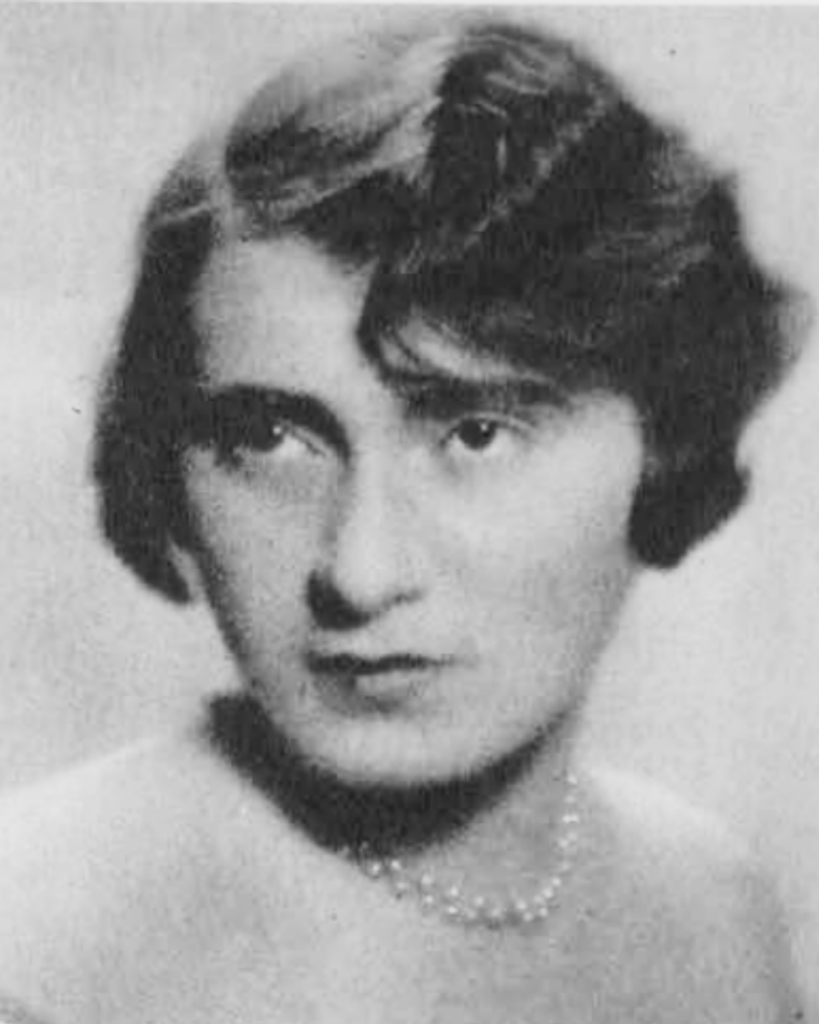Helena Ostrowska (1902-1944)
Opera singer, mezzo-soprano. She performed at the Femina Theatre and as a soloist at concerts with the Jewish Symphony Orchestra.
Helena was born on 15 March 1902 in Pajęczno (currently in the Łódź province). She was raised in a wealthy, assimilated Jewish family, the daughter of Abram and Dwoyra. She had three siblings: Josek, Henryk and Irena. She did not know Yiddish, and spoke only Polish. She married a doctor, Gustaw Zuckerwar, with whom she had a daughter, Joasia, born in 1940.
Ostrowska was a graduate of the music conservatory in Warsaw, where she trained as an opera singer. In the 1930s, she gained recognition as an artist, performing as a singer, among others, at the Łódź Philharmonic, and also gave concerts abroad.

Helena Ostrowska | „Głos poranny. Dodatek ilustrowany” 1932 r.
In the Warsaw ghetto, she lived with her family at 74 Żelazna Street, where her husband ran a medical practice. In September 1941, the Femina Theater hosted the premiere of the operetta “Princess Czardaszka“, in which Ostrowska played the main role. The action of E. Kalman’s operetta, popular on world stages, directed by Edmund Minowicz, was moved to the ghetto, between Sienna and Leszno Streets. The newspaper “Gazeta Żydowska” published a review of the play:
“The title role was played by Ms. Helena Ostrowska, who had previously been known only as a singer, and who now appeared on stage for the first time. This debut can be considered a happy one. Mrs. Ostrowska, gifted with a mezzo-soprano with an outstanding operatic flair, was received very warmly by the audience.” This operetta enjoyed incredible success in the ghetto, with performances taking place every day for many months.
Helena also performed at charity events and special events organized in honor of individual artists in the ghetto. After a concert for Winter Aid, which took place in January 1942, a reviewer for the “Gazeta Żydowska” praised the singer’s vocal abilities:
“That true musical art still exists […] was proven by Mrs. Helena Ostrowska, who performed for the first time after a long break caused by illness. […] but showed that she is one of the very few singers in our District who combine perfectly trained vocal material with the gift of truly musical interpretation. Mrs. Ostrowska performed the great aria of Santuzza from Mascagni’s opera <<Cavalleria Rusticana>> and the popular song “ I Love You, Grieg”.
As a soloist, she sang at weekly chamber evenings in the hall of the “Gospoda Artystów” – at Orla 6, as well as at concerts of the Jewish Symphony Orchestra. In June 1942, Helena played the title role of Odette in the operetta “La Bayadère” at the Femina theater. The operetta was performed with great splendor – with a specially enlarged orchestra, male and female choir, ballet, and a great cast. Performances took place every day, for a month, until the Great Deportation Action of the ghetto began.
In January 1943, her husband was murdered during the second liquidation action of the ghetto. Helena and her daughter then escaped from the ghetto through the sewers. “Deceived by a paid guide, she wandered through the sewers with her child until she miraculously managed to get out with the help of unknown people” – this is how Stefania Grodzieńska recalled her exit from the ghetto.
After leaving the ghetto, she hid for over a year with several other people, including the writer and actress Stefania Grodzieńska and Stefania’s husband, the comedy writer Jerzy Jurandot, in the house of Zofia and Gabriel Kijkowski in Gołąbki near Warsaw. In her memoirs published after the war, Grodzieńska recalls that thanks to Helena, the cultural life of Gołąbki came to life immensely. In one of the rooms there was a piano, at which Helena would sit in the evenings to play and sing. Helena also taught all the members of the household who were in hiding to sing.
“Since the beginning of the war, none of us had heard music […] We waited all day for these evenings. Hela had a lot of femininity and charm. I can see her sitting at the piano, tilting her blond head towards us, her hair in a crown of braid, and singing opera arias, Moniuszko’s songs, playing Chopin. Then we all sang military songs, legion songs, pre-war hits together with her, recalling such a recent, lost reality”.
After leaving the ghetto, Helena hid “on Aryan papers” under a changed name as Irena Maria Jabłońska, and her daughter as Zosia. Every morning she told the child to repeat: “My name is Zosia Jabłońska, my mother’s name is Irena, I don’t remember my father, he died before the war”.
In 1944, on March 17, the house in Gołąbki was surrounded by a group of Germans, who then entered the house. There were six people in the house at the time. Grodzieńska and Jurandot successfully played the roles of local villagers and managed to convince the Gestapo that they were not Jews. However, Helena did not succeed. “She had a ‘good look’, she had documents, but once again Francis’ theory was proven right, that it is not the facial features but face expression that determines the recognition of ‘origin’. With that pallor, terror in her eyes, the downturned corners of her mouth, she could not have raised any doubts,” recalled Stefania Grodzieńska. Little Joasia kept repeating: my name is Zosia Jabłońska, my mother’s name is Irena… However, the Germans did not believe the mother and daughter, beat Helena, took them out of the house and took them both to Pawiak prison. They were shot there the same day.
Stefania Grodzieńska named her daughter, who was born right after the war, Joanna, in memory of Helena Ostrowska’s 4-year-old (at the time of her death) daughter.
In 1999, Grodzieńska published a poem written by Ostrowska, found in her belongings on the day Helena was arrested by the Gestapo:
My child is so tiny
She cannot read or write yet
But she knows what she has to say
When someone asks her name
She will lie, even though she knows it is not nice
And this troubles her secretly
But she will lie, because she will try
To save her sad life
Bibliography:
- Makower, Pamiętnik z Getta Warszawskiego, Wrocław 1987
- Stefania Grodzieńska, Urodził Go Niebieski Ptak, Warsaw 1988
- Leon Błaszczyk, Żydzi w kulturze muzycznej ziem polskich w XIX i XX wieku. Słownik biograficzny, Warsaw 2014
- Ring. I/657/2
- “Gazeta Żydowska” 1940, no. 38
- “Gazeta Żydowska” 1941, no. 91
- “Gazeta Żydowska” 1942, no. 4
- “Gazeta Żydowska” 1942, no. 17
- “Gazeta Żydowska” 1942, no. 40
- “Gazeta Żydowska” 1942, no. 42
- “Gazeta Żydowska” 1942, no. 46
- “Gazeta Żydowska” 1942, no. 8

